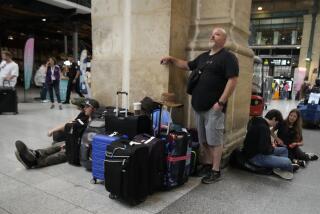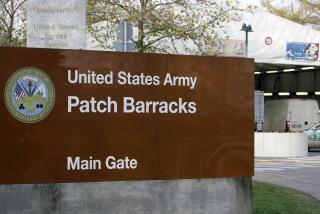Paris on Alert for More Bombings
- Share via
Europe
France: Hundreds of soldiers and marines patrolled transit stations, airports and tourist sites in Paris after a terrorist bomb exploded aboard an evening commuter train Dec. 3, leaving four people dead and more than 80 injured. The bombing at the Port Royal regional transit station south of Luxembourg Gardens may be a renewal of a campaign by Algerian Muslim extremists that killed eight people and injured 160 last year. As part of the heightened security, barricades went up outside schools, and police and soldiers checked identity papers and occasionally frisked pedestrians in some areas of the city.
Hungary: Budapest’s colorful night life has been rattled by at least a dozen grenade attacks near restaurants and nightclubs in a two-month period, the Reuters news service reports. There have been damages, but so far no injuries. The attackers have not been identified, but police attribute the bombings to a Mafia-style gang war for control of clubs, and they say five recent shootings are related. Police have installed security cordons around night spots, and club activity has quieted as a result, owners say. In general, Hungary has a low rate of violent crime. But the U.S. State Department advises that “street crime, which occasionally involves violence, has increased, especially at night near major hotels and restaurants and on public transportation.”
Ukraine: Citing the “breakdown of the country’s social fabric,” the State Department cautions that Ukrainian criminals increasingly view Western visitors as choice targets. U.S. diplomats describe a con game popular on the streets of Kiev, the capital: A confidence trickster starts up a conversation with a visitor, then pretends to notice a wallet lying on the street. It is full of money, and the con man (or woman) pockets the wallet and suggests that they keep it and split the money. Suddenly, trickster No. 2 arrives, asking if they have found a wallet and demanding to search them both. To establish his innocence, the visitor may agree to offer his own wallet for examination. If he does, the other two are gone with his money in a flash.
Briefly . . .
Greece: Demanding higher farm prices and state subsidies, farmers put up more than 20 roadblocks throughout Greece last month, choking off main roads and rail lines with tractors and burning tires. Protesting next year’s national budget, several workers’ groups planned strikes in coming weeks.
Jamaica: Violent crime is skyrocketing, with 739 murders in the first eight months of this year, a total almost equal to the murders in all of 1995, Reuters reports. Most murders occur in the poorer neighborhoods of Kingston. Two Americans were killed in Jamaica during the past year--one a visitor, one a resident--but neither murder occurred during the eight-month reporting period.
Angola: Already tagged as a risky place for Americans, Angola is experiencing a wave of daylight robberies of expatriates, according to the U.S. Embassy in Luanda, the capital. The latest victim was an American woman attacked by armed robbers. There are no longer any neighborhoods or times of day considered safe in Luanda, the embassy says.
Vietnam: The government announced plans for closer monitoring of dissidents and foreigners. No details were given, but last year the U.S. liaison office in Hanoi described the government’s intelligence-gathering as already very sophisticated, adding, “One must assume that all rooms, telephones and fax machines can be monitored.”
Hot spots: State Department travel warnings are in effect for Afghanistan, Algeria, Angola, Bosnia-Herzegovina, Burundi, Central African Republic, Colombia, Iran, Iraq, Lebanon, Liberia, Libya, Nigeria, Rwanda, Sierra Leone, Somalia and Sudan.
The U.S. State Department offers recorded travel warnings and advisories at (202) 647-5225; the fax line is (202) 647-3000.
More to Read
Sign up for Essential California
The most important California stories and recommendations in your inbox every morning.
You may occasionally receive promotional content from the Los Angeles Times.













